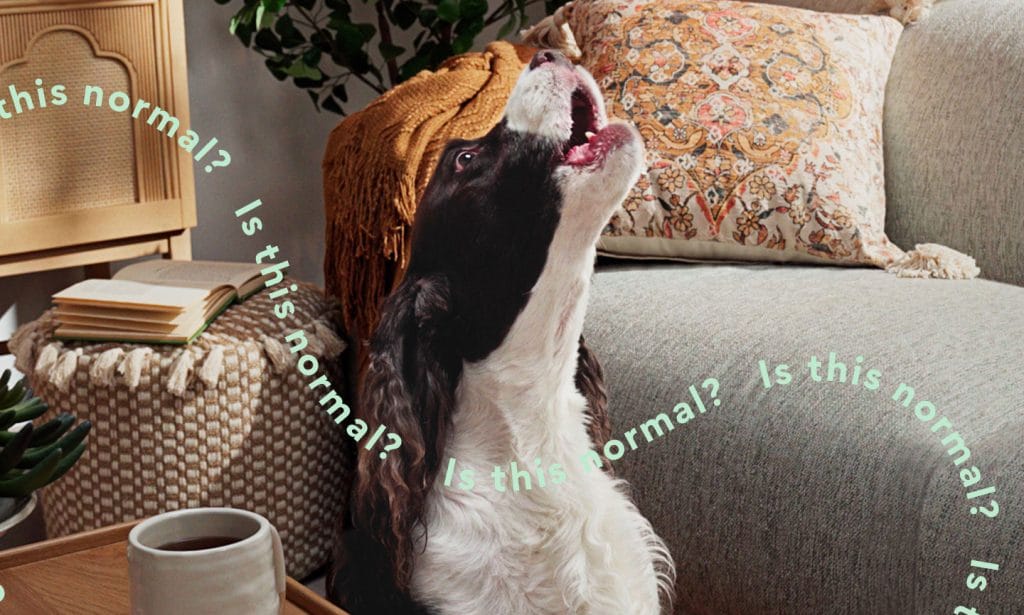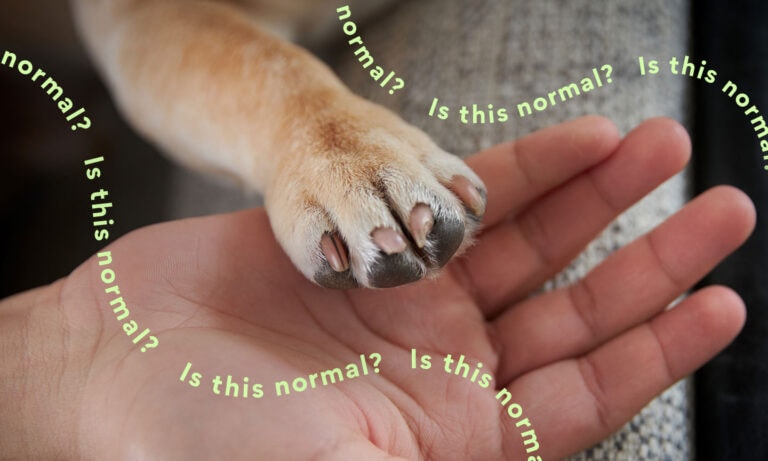Q:My dog howls and makes loud, high-pitched noises whenever they hear a siren or another dog howling. It’s almost like they’re trying to mimic the sound. Is this normal? What should I do about it?
A: You may have heard your pup bark at the mailman or growl when you break out the vacuum cleaner, but it can be a little alarming to hear your dog let out a howl for the first time. Thankfully, this canine behavior is usually normal, but it is worth identifying exactly why your dog is howling because it could be due to a behavioral or medical issue.
Why Do Dogs Howl?
Dog howling is a form of communication. Reasons why dogs may howl include:
- Expressing emotion—good or bad
- Seeking attention
- As a response to certain noises (such as a siren)
- Separation anxiety
- Mimicking (for example: someone is singing, or another dog is howling)
- Underlying health issues
“Each dog will have its own reason for howling—and, yes, they can be happy or sad when they howl,” says Sandra Mitchell, DVM, DABVP. “They may also be worried, nervous, excited, or just looking for attention!”
Do All Dogs Howl?
You’ve probably seen the viral videos of Huskies or Beagles dramatically howling and seemingly throwing temper tantrums, but other breeds are capable of howling too (even if you’ve never heard them do it before).
In fact, all dogs can howl, although certain breeds of domestic dogs may be more predisposed to howling, according to Chelsea Murray, CPDT-KA, KPA-CTP, CTDI, trainer and owner of Pawsitive Futures Trainer & Behavior in Atlanta, Georgia. “Some northern, primitive, and hound breeds are more likely to make this unique noise,” she says. Like the Huskies and Beagles in those viral videos.
What Does Dog Howling Sound Like?
The way dogs howl can vary. “Some dogs howl louder or longer than other dogs, and the sound of the howl may be different, depending on the message the dog is wanting to convey,” Dr. Mitchell says.
If the dog may is trying to mimic certain sounds, such as another dog barking, a baby crying, or singing, that can result in different howls as well. Regardless of the circumstance or dog breed, “I think, overall, howls sound similar,” says Wailani Sung, DVM, DACVB, director of behavior and welfare programs at San Francisco SPCA in San Francisco, California. “They typically occur in the 400Hz to 2000Hz range.”
Do Dogs Howl to Communicate with Each Other?
While we know that howling dogs could be trying to communicate with humans, it’s a little unclear if—or why—they howl to communicate with other dogs. Dr. Sung says that this dog behavior may be learned from their wild ancestors like coyotes or wolves.
“Wolves howl, we think, for communication between pack members, especially individuals that have been separated from the pack,” she says. “Dogs do not have the same pack structure as wolves; however, some dogs may howl at neighbor dogs, but we don’t necessarily know the function of that howling.”
Are Dogs Sad When They Howl?
Dogs may howl when they are sad. But how do we know if the howling is due to sadness or another emotion, like joy? By looking for other stress signals, says Murray, which include:
- Digging
- Scratching
- Drooling
- Lack of appetite
- Destructive behavior (such as inappropriate chewing, accidents in the house, counter surfing, etc.)
“As we evaluate the situations when our dogs are howling, we can conclude if this howling is one of joy, like a family musical sing-along, or if this howling is in conjunction with other stress signals, like scratching at the door when we leave, indicating more unpleasant emotions of sadness,” Murray says.
When to Be Concerned About Dog Howling
If your pup howls when you’re singing at the top of your lungs in the shower, they’re probably just joining in on the fun. However, howling can be caused by stress, pain or an underlying medical issue.
If your dog is howling and engaging in destructive behavior or exhibiting any of the signs of stress listed above.
These could be signs of behavioral issues, like separation anxiety, and you should reach out to a trainer or behaviorist for help. “When the dog is howling around stressful circumstances—like being left alone, during storms, or when crated—some behavior modification training might be needed to make the dog feel more comfortable,” Murray says.
In the case of separation anxiety, Amy Tate, DVM, co-owner and managing partner of Riverview Animal Clinic in Birmingham, Alabama, advises being mindful of how you respond to the howling: “Often, we humans reward it by responding to this attention-seeking behavior.” For example, if your dog wakes you up in the middle of the night howling and you immediately comfort them or feed them, they’ll learn to associate this behavior with good things.
If your dog’s howling behavior changes suddenly and/or drastically.
Changes may include a normally quiet dog who has started to howl, a dog’s howl becoming more intense, or howling at new times of the day and you don’t know why. This could be due to pain or injury, or an underlying medical issue such as cognitive dysfunction disorder, which is a degenerative brain condition typically seen in senior dogs, or in younger dogs, congenital brain disorders or seizure-like onset. Either way, you’ll want to have your dog checked out by a vet.
How to Get Your Dog to Stop Howling
To stop a dog from howling, you need to identify and address the underlying cause. First, take a trip to determine if it's due to medical or behavioral issues. (See above section for more advice on those.) If those have been ruled out, try the following:
- Reward your dog with toys or treats when they are quiet. “The more we reinforce a behavior, the more it will happen,” Murray says.
- Turn howling into a dog trick, so that your dog only offers this behavior on cue. (Get instructions on how to teach your dog to vocalize on cue and to be quiet here.)
- Increase your dog’s physical activity by taking them on a long walk, going on a hike, or playing fetch in the backyard (fetch toys are sure to get the party started!). A well-exercised dog is likely to be more relaxed and not need as much attention.
- Provide more mental enrichment with slow feeders, puzzle toys, lick mats or treat-dispensing toys. Bored and attention-seeking howlers especially can benefit from keeping their brains busy.
Learn more about weird dog behavior:
Share:









